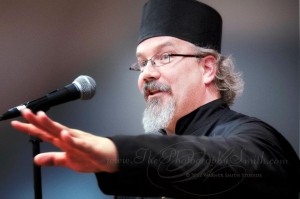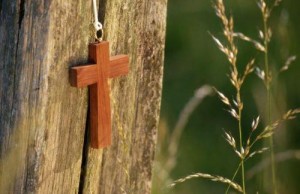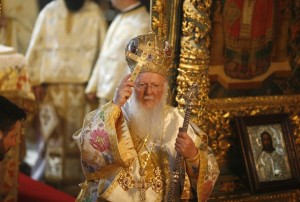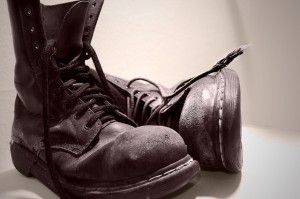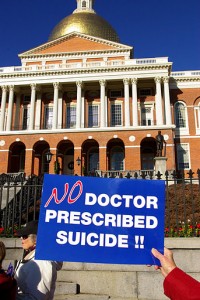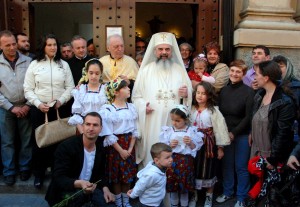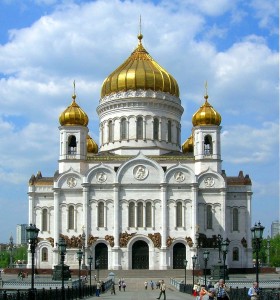
Editor: This article should put into perspective why the Orthodox Christian in Russia reacted the way they did to this incident. We have to remember the past or we will be doomed to repeat it!
August 20, 2012
It sounds like a scriptwriter’s dream.
Here we have Russia, a vastly powerful country with a floundering democracy, facing the imminent threat of tyranny. That danger is personified by Vladimir Putin, a former KGB man who looks like, well, a former KGB man, as imagined by John Le Carré. Standing in his way is a gallant resistance movement symbolized by an all-female rock band, a group of punky young performance artists called Pussy Riot.
And indeed it is. Putin may be a thug, and Pussy Riot might be feminist warriors for human rights, but the particular act for which they faced trial is much more controversial than is commonly reported in the West.
A good case can be made that it was a grievous act of religious hate crime, of a kind that would be roundly condemned if it happened in a country that the West happened to like. (I’m also wondering why liberals are suddenly so fond of a band that claims inspiration from the “Oi!” music invented by Far-Right British skinheads).
Last March, three members of Pussy Riot staged an unauthorized “concert” in Moscow’s Cathedral of Christ the Savior. Standing before the altar, they sang a pseudo-hymn to the Virgin, urging her to remove Putin, and condemning the Patriarch Kiril as his slavish disciple. They have now been convicted of what a judge termed “hooliganism driven by religious hatred.”
Few Western commentators have taken that religious element too seriously, but it is central to what Hollywood might term the back-story.
Look, above all, at the site of the demonstration. Historically, Christ the Savior was a central shrine both of the Orthodox faith and of Russian national pride, and for that reason, the Bolsheviks targeted it for destruction. In 1931, in a notorious act of cultural vandalism, the Soviet government dynamited the old building, leveling it to the ground, and replacing it with a public swimming pool. Not until 1990 did a new regime permit a rebuilding, funded largely by ordinary believers, and the vast new structure was consecrated in 2000. The cathedral is thus a primary memorial to the restoration of Russia’s Christianity after a savage persecution.
It’s difficult, perhaps, for Westerners to realize how bloodthirsty that government assault was. Russia in 1917 was overwhelmingly Orthodox, and in fact was undergoing a widespread religious revival. Rooting out that faith demanded forceful action by the new Bolshevik government, which had no scruples about imposing its will on the wishes of a vast majority. Government leaders like Alexandra Kollontai — the self-proclaimed Female Antichrist — illegally seized historic churches and monasteries, and used soldiers to suppress the resulting demonstration. Hundreds were killed in those actions alone.
Through the 1920s, the Bolsheviks systematically wiped out the church’s leaders. Metropolitan Vladimir of Kiev perished in 1918, shot outside the historic Monastery of the Caves, while Bishop Hermogenes of Tobolsk was drowned in a Siberian river. Archbishop Andronicus of Perm was killed the following year, followed by most of his clergy. In 1920, Bishop Joachim of Nizhni Novgorod was crucified upside down from the iconostasis in his cathedral. In 1922, a firing squad executed the powerful Benjamin, Metropolitan of Petrograd/St. Petersburg. The repression was indiscriminate, paying no attention to the victims’ records as critics of Tsarist injustice and anti-Semitism.
Persecution claimed many lives at lower levels of the church, among ordinary monks and priests. We hear of clergy shot in their hundreds, buried alive, mutilated, or fed to wild animals. Local Red officials hunted down priests as enthusiastically as their aristocratic predecessors had pursued wolves and wild boar. The number of clergy killed for their faith ran at least into the tens of thousands, with perhaps millions more lay believers.
The regime also rooted up the churches and monasteries that were the heart of Russian culture and spiritual life. Officials wandered the country, vandalizing churches, desecrating saints’ shrines and seizing church goods, and murdering those who protested the acts. Militant atheist groups used sacred objects to stage anti-religious skits and processions. Between 1927 and 1940, active Orthodox churches all but vanished from the Russian Republic, as their numbers fell from 30,000 to just 500.
In the process of dechristianization, the crowning act came in 1931 with the obliteration of the Cathedral of Christ the Savior. For the Bolsheviks, it was the ultimate proof of the Death of God.
But, of course, Resurrection did come, so that a new cathedral would stand to mark a new century. The long nightmare was over.
Yet Russia’s new religious freedom is a very tender shoot, and the prospect of future turmoil has to agonize those believers who recall bygone horrors. These fears are all the more pressing when modern-day activists seem to reproduce exactly the blasphemous deeds of the past, and even in the precise places. When modern-day Orthodox look at Pussy Riot, they see the ghosts of Alexandra Kollontai and her militiamen, or the old Soviet League of Militant Godless. Are they wrong to do so?
I just offer an analogy. Imagine a dissident group opposed to the current governments of Poland or Hungary. In order to grab media attention, they take over one of those countries’ recently restored synagogues, and frame their complaint in the form of a pseudo-Jewish prayer. Horrified, the authorities arrest them and threaten harsh criminal penalties. Not only would international media fully support the governments in those circumstances, but they would complain bitterly if police and courts showed any signs of leniency. However serious a group’s grievances, there is absolutely no justification for expressing them with such mind-boggling historical insensitivity, and in such a place. Anywhere but there!
So no, I won’t be giving to any Pussy Riot support groups.
Page Printed from: http://www.realclearreligion.org/articles/2012/08/20/the_new_soviet_league_of_militant_godless.html at August 20, 2012 – 09:28:58 AM EDT


